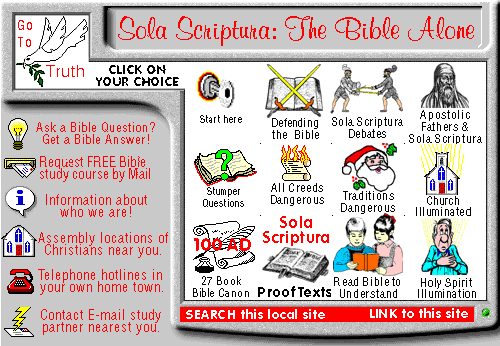Sola Scriptura: The Bible alone is enough!
Apostolic Fathers used scripture as the primary defense against false doctrine.
 Apostolic Fathers: Dates they lived and other information.
Apostolic Fathers: Dates they lived and other information.
 Apostolic Fathers: Five kinds of Tradition.
Apostolic Fathers: Five kinds of Tradition.
405 AD: John Chrysostom:
"For doctrine." For thence we shall know, whether we ought to learn or to be ignorant of anything. And thence we may disprove what is false, thence we may be corrected and brought to a right mind, may be comforted and consoled, and if anything is deficient, we may have it added to us. "That the man of God may be perfect." For this is the exhortation of the Scripture given, that the man of God may be rendered perfect by it; without this therefore he cannot be perfect. Thou hast the Scriptures, he says, in place of me. If thou wouldest learn anything, thou mayest learn it from them. And if he thus wrote to Timothy, who was filled with the Spirit, how much more to us! "Thoroughly furnished unto all good works"; not merely taking part in them, he means, but "thoroughly furnished." (John Chrysostom, Homily 9, commentary on 2 Tim 3:16-17)

John, who is commenting on 2 Tim 3:16-17, clearly believes the scriptures are all-sufficient and nothing else is needed for truth. But he says something far more profound that modern Roman Catholic and Orthodox leaders cringe at: Chrysostom, interprets Paul's statement as saying that "the scriptures were given IN PLACE OF Paul". This is exactly what we are saying! We say that from 30 - 50 AD, revelation was 100% oral because none of the New Testament was written. Then from 50 - 100 AD scripture was completed. Finally from 100 AD to the second coming our final authority is the scriptures. God's whole plan was to start with inspired oral revelation, then part oral, part scripture, and finally when scripture was complete, it became the all-sufficient authority. We do not dispute that oral traditions continued after 100 AD, just that as time moved along, oral tradition by its very nature, became less important. Today oral tradition is utterly worthless since the Roman Catholic and Orthodox churches both claim they are the right oral tradition, yet they differ so greatly in doctrine, that they are not even "in communion" with each other!
"For how is it not absurd that in respect to money, indeed, we do not trust to others, but refer this to figures and calculation; but in calculating upon facts we are lightly drawn aside by the notions of others; and that too, though we possess an exact balance, and square and rule for all things, the declaration of the divine laws? Wherefore I exhort and entreat you all, disregard what this man and that man thinks about these things, and inquire from the Scriptures all these things; and having learnt what are the true riches, let us pursue after them that we may obtain also the eternal good things; which may we all obtain, through the grace and love towards men of our Lord Jesus Christ, with Whom, to the Father and the Holy Spirit, be glory, might, and honor, now and ever, and world without end. Amen." (John Chrysostom, Homily 13, commentary on 2 Cor 7:1)

Chrysostom calls scripture, "exact balance, and square and rule for all things, the declaration of the divine laws". We not only agree, but ask why this sounds so opposite to how Catholics describe the Bible.
""So then, brethren, stand fast, and hold the traditions which ye were taught, whether by word, or by Epistle of ours." Hence it is manifest, that they did not deliver all things by Epistle, but many things also unwritten, and in like manner both the one and the other are worthy of credit. Therefore let us think the tradition of the Church also worthy of credit. It is a tradition, seek no farther. Here he shows that there were many who were shaken." (John Chrysostom, Homily 4, commentary on 2 Thess 2:15)

Chrysostom clearly believes in a divine oral tradition that teaches some things, not contained in scripture. While we would strongly disagree with Chrysostom on this point, we honestly admit that he seems to take such a view. After all, we know there was a gradual movement to emphasize church tradition over what the Bible says, and Chrysostom at 400 AD, may be indicative that things are changing in that direction. But in light of what Chrysostom has already said about the scriptures, we could only guess that the specific things that make up this "unwritten tradition" are insignificant and of a secondary importance. Like modern Catholics, Chrysostom merely makes the claim of "unwritten tradition" without ever really giving us a specific example. Provide us a specific list! Without such an example, we object that modern Catholics squeeze in all their extra-biblical doctrines. Jerome, who also lived at the same time as Chrysostom in 400 AD, does provide such a list in (Jerome, Dialogue Against the Luciferians, 8), like drinking "milk and honey" immediately after being baptized. So we can in fact prove out position correct, that much of the early church's "unwritten tradition" was over insignificant things like this. Further, neither the Orthdox or Catholic churches even do this today, which further proves that such "unwritten tradition" really involves what we call "expedient tradition".
by Steve Rudd

Go To Start: WWW.BIBLE.CA

![]() Apostolic Fathers: Dates they lived and other information.
Apostolic Fathers: Dates they lived and other information.![]() Apostolic Fathers: Five kinds of Tradition.
Apostolic Fathers: Five kinds of Tradition.